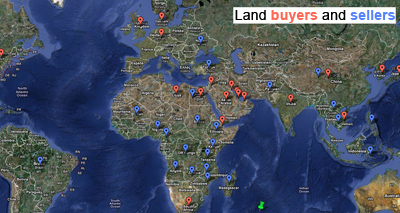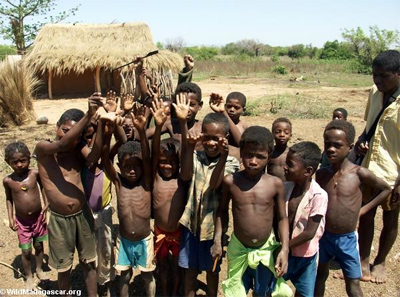|
|
Over two-and-half million hectares in the Democratic Republic of the Congo; half a million hectares in Tanzania; and a quarter of a million hectares in Libya: these figures represent just some of the recent international land deals where wealthy countries buy up land in poorer nations for food, and sometimes biofuel, production. The controversial trend has sparked a recent report from the International Food Policy Research Institute (IFPRI) highlighting what nations have to gain—and lose—from participating in such deals.
Spurred on by the global food crisis, nations in the Middle-east and Asia have begun purchasing agricultural land abroad in order to make-up for a lack of arable land at home. Due to water shortages across the region, Middle-eastern nations like Qatar, Jordan, Kuwait, and Saudi Arabia have turned largely to Africa for thousands upon thousands of hectares of land, while massive populations and dwindling land has led India, South Korea, and China to also buy up farmland overseas.
 Land buyers and sellers. Click to enlarge. |
According to IFPRI it was the food crisis, along with “increased pressures on natural resources, water scarcity, export restrictions imposed by major producers when food prices were high, and growing distrust in the functioning of regional and global markets”, which pressed these nations into seeking deals abroad that are unique in history for the size of land purchased or leased.
IFPRI’s report, compiled by director general of IFPRI, Joachim von Braun, and senior research fellow in the Environment and Production Technology Division of IFPRI, Ruth Meinzen-Dick, sees the trend as positive to the extent in which it provides investment, technology, and education to poor nations, many of which have fallen behind in food production compared to industrial nations. The report also lists “the creation of a potentially significant number of farm and off-farm jobs, development of rural infrastructure, and poverty-reducing improvements such as construction of schools and health posts” as possible positive outcomes stemming from such deals.
So, why has the reaction from local people and media has been cautious to downright hostile?
Several deals have fallen through due to local uneasiness. Both the Philippines and the Mozambique have dropped Chinese land-deals, while a deal in Madagascar to provide South Korea with 1.3 million hectares has been linked to the coup which overthrew former president, Marc Ravalomanana. Local people often view such deals as threatening their livelihood, and not without reason. Environmentalists worry that wealthy nations are devastating poorer nations’ forests and natural resources for unending plantations or unsustainable farm systems.
View “Land Grabbing” by Foreign Investors in Developing Countries in a larger map
In its report IFPRI points out that many of these deals could be bad for local farmers unless the agreements include specific provisions to protect them. On the largeness of the international stage, local landowners in poor countries have little power to negotiate fair terms for being displaced from their land to make room for foreign farmers. In addition, the report’s authors note that “this inequality in bargaining power is exacerbated when the smallholders whose land is being acquired for foreign investment projects have no formal title to the land, but have been using it under customary tenure arrangements.” Such a situation makes it possible for local governments, who technically own the land, to simply push people off land without compensation. The report warns that these deals could lead to political turmoil, even violent uprisings, as illustrated in Madagascar.
Last year, in the midst of many agreements, the director general of the UN’s Food and Agricultural organization, Jacques Diouf, warned that “the risk [of these deals] is of creating a neo-colonial pact for the provision of non-value-added raw materials in the producing countries and unacceptable work conditions for agricultural workers.” Media sources worldwide jumped on the term ‘neo-colonial,’ interpreting such agreements as a new trend by the wealthy and powerful to subject the weak and their resources.
Consequences of such deals are not just social: environmental problems that come with these deals could devastate local resources and ecosystems, further impoverishing local people.
IFPRI points out that “introducing intensive agricultural production can threaten biodiversity, carbon stocks, and land and water resources”, for example “converting forests or rangelands to monocropping reduces diversity in flora, fauna, and agrobiodiversity, as well as aboveground and subsurface carbon stocks.” The report warns that while irrigation, fertilization, and pesticides may help increase yields, they could also lead to long-term problems with salinity, erosion, and pollution.
Despite the importance of environmental issues over the long-term, such issues are less likely to thwart an agreement than social unrest.
The report further warns that there is a disquieting lack of transparency in many of these agreements: “the status of the deals, the size of land purchased or leased, and the amount invested are often still murky. Well-documented examples are scarce, and some reports are contradictory.” The IFPRI recommends increased transparency to make certain that deals are positive for all parties involved.
 Last year Madagascar offered up half its arable land — for free %#8212; to a South Korean corporation. 50 percent of children in Madagascar “suffer retarded growth due to a chronically inadequate diet,” according to the World Food Programme. |
The report also makes other recommendations including implementing projects that do not evict local farmers, but instead contracting these often poor farmers to sell their goods to the foreign nation in exchange for additional credit, support, and technology. In addition, careful environmental studies should be conducted before any agreement is made, and environmental monitoring should continue after the agreement is enacted. Finally, the report recommends that all agreements should adhere to the rule that in the midst of a national food crisis, agricultural products should go to the local population and not be sent abroad.
Despite such recommendations from IFPRI and international concern (and condemnation), few agreements, if any, have been so progressive. The victims are often the poorest of the poor and already degraded ecosystems. Only the future will tell if nations, both on the buying end and the selling, will learn from Madagascar’s example by proceeding cautiously and openly: land remains a potent catalyst for social unrest and political upheaval.
Policy Brief No. 13 “Land Grabbing” by Foreign Investors in Developing Countries – Risks and Opportunities Joachim von Braun and Ruth Meinzen-Dick. April 2009
Related articles
Republic of Congo to turn over 25 M acres of land to South African farmers
(04/20/2009) The government of Republic of Congo (Brazzaville) has offered 25 million acres (10 million hectares) of land to South African farmers in an effort to improve the central African nation’s food security, reports Reuters. The area is nearly twice the amount of arable land in South Africa.
Political violence in Madagascar may lead Daewoo to abandon controversial farm project
(02/10/2009) Political instability and low commodity prices may lead South Korea’s Daewoo Logistics to delay or pull out of a controversial agricultural project in Madagascar, reports Reuters.
Malaysia targets Africa and the Amazon for oil palm expansion
(08/25/2008) Facing land scarcity at home and environmental complaints, Malaysian palm oil producers should look overseas to expand operations, a high-ranking Malaysian agricultural minister said Monday.